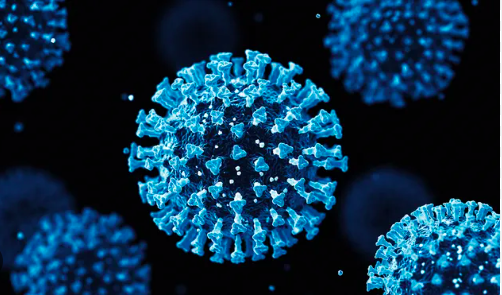Trending Stories
COVID-19 Emergency Room Visits and Deaths Are Increasing: Should You Be Worried?

COVID-19 Emergency Room Visits and Deaths Are Increasing: Should You Be Worried?
The COVID-19 pandemic has been an ongoing challenge for the world since its emergence. Despite progress in vaccinations and treatments, recent data indicates a surge in emergency room visits and deaths due to COVID-19. This article delves into the reasons behind this uptick, evaluates the current situation, and addresses the concerns of the public regarding their safety and well-being.
Understanding the Current Surge
The Nature of COVID-19 Waves
COVID-19, like many viruses, tends to come in waves. These waves can be influenced by various factors, including seasonal changes, new variants, and human behavior. The summer of 2024 has seen a notable increase in cases, leading to more emergency room visits and a rise in mortality rates.
Factors Contributing to the Surge
Several key factors have contributed to the recent surge in COVID-19 cases:
- New Variants: Mutations in the virus can lead to new variants that may spread more easily or evade immunity from previous infections and vaccinations.
- Vaccine Hesitancy: Some individuals remain unvaccinated or under-vaccinated, leaving them vulnerable to severe illness.
- Relaxed Restrictions: As restrictions have been eased in many areas, increased social interactions have provided more opportunities for the virus to spread.
- Seasonal Influence: Similar to other respiratory viruses, COVID-19 can see increased transmission in certain seasons due to changes in human behavior and environmental factors.
The Impact on Emergency Rooms
Increased Strain on Healthcare Systems
Emergency rooms across the country are experiencing increased patient loads due to the surge in COVID-19 cases. This strain on healthcare systems can lead to longer wait times, reduced availability of medical resources, and increased stress on healthcare workers.
Types of Cases Seen in ERs
The types of COVID-19 cases seen in emergency rooms vary widely. They range from mild symptoms that require observation to severe cases needing intensive care.
Common symptoms prompting ER visits include:
- Severe respiratory distress
- High fever and chills
- Persistent chest pain or pressure
- Confusion or inability to stay awake
COVID-19 Deaths: Analyzing the Data
Who Is Most at Risk?
The recent rise in COVID-19 deaths predominantly affects certain groups:
- Unvaccinated Individuals: Those who have not received the vaccine are at a significantly higher risk of severe illness and death.
- Elderly and Immunocompromised: Older adults and those with weakened immune systems are more susceptible to severe outcomes.
- People with Underlying Health Conditions: Conditions such as diabetes, heart disease, and chronic respiratory illnesses can exacerbate the severity of COVID-19.
Comparison with Previous Waves
While the number of deaths has increased, it’s essential to compare these figures with previous waves to understand the context. Advances in medical treatments and higher vaccination rates have generally led to lower mortality rates compared to the pandemic’s earlier stages. However, any increase in deaths is a cause for concern and necessitates prompt public health responses.
Public Health Measures and Personal Safety
Ongoing Vaccination Efforts
Vaccination remains the most effective tool in combating COVID-19. Public health officials continue to encourage vaccinations and booster shots to enhance immunity and reduce the severity of the disease.
Mask Mandates and Social Distancing
In areas with high transmission rates, mask mandates and social distancing measures may be reinstated to curb the spread of the virus. These measures have proven effective in previous waves and are critical in protecting vulnerable populations.
Personal Precautions
Individuals can take several steps to protect themselves and others:
- Get Vaccinated: Ensure you are up-to-date with COVID-19 vaccinations and booster shots.
- Wear Masks: In crowded or enclosed spaces, wearing a mask can reduce the risk of transmission.
- Practice Good Hygiene: Regular handwashing and sanitizing surfaces can prevent the spread of the virus.
- Stay Informed: Keep up with the latest public health guidelines and updates from reliable sources.
Addressing Concerns and Misconceptions
Should You Be Worried?
While the increase in COVID-19 cases and deaths is concerning, it is important to maintain a balanced perspective. Widespread vaccination and improved treatments have provided significant protection against the virus. Staying vigilant and following public health guidelines can greatly reduce your risk.
The Role of Media and Information
The media plays a crucial role in informing the public, but it can also contribute to fear and anxiety. It is essential to seek information from credible sources and avoid sensationalism. Understanding the data and the context can help alleviate unnecessary worry.
Conclusion
The rise in COVID-19 emergency room visits and deaths is a stark reminder that the pandemic is not over. However, with ongoing vaccination efforts, adherence to public health measures, and personal precautions, we can mitigate the impact of this surge. Staying informed, vigilant, and proactive is key to navigating this challenging time.
FAQs
1. How effective are the current COVID-19 vaccines against new variants?
The current COVID-19 vaccines have shown effectiveness against various variants, although the level of protection may vary. Booster shots are recommended to enhance immunity and provide better protection against new strains.
2. What should I do if I experience COVID-19 symptoms?
If you experience symptoms such as fever, cough, or difficulty breathing, it is important to get tested for COVID-19. Follow public health guidelines, isolate yourself to prevent spreading the virus, and seek medical attention if necessary.
3. Are there any new treatments available for COVID-19?
Yes, there are several treatments available for COVID-19, including antiviral medications and monoclonal antibodies. These treatments can reduce the severity of the disease and are typically administered in a healthcare setting.
4. How can I stay safe in public places during a COVID-19 surge?
To stay safe in public places, wear a mask, practice social distancing, and avoid crowded areas. It is also important to follow any local health guidelines and stay informed about the current situation in your area.
5. What is the future outlook for the COVID-19 pandemic?
The future of the COVID-19 pandemic depends on various factors, including vaccination rates, the emergence of new variants, and public health measures. Continued vigilance, vaccination efforts, and adherence to guidelines will be crucial in managing the pandemic.
References
Trending Stories
Can Supplements Fix Belly Fat? Experts Weigh in on the “Cortisol Pouch” Myth
Trending Stories
Sister Regina Liu: Empowering Health Through Acupuncture

Sister Regina Liu: Empowering Health Through Acupuncture
In the bustling world of healthcare, Sister Regina Liu stands out as a beacon of holistic healing. Her journey into the world of acupuncture is not only inspiring but also transformative for the countless individuals she has treated.
Through her dedication, Sister Regina has brought traditional Chinese medicine to the forefront, offering an alternative and complementary approach to modern medical practices.
The Journey of Sister Regina Liu
Sister Regina Liu’s path to becoming a renowned acupuncturist began with her deep-rooted interest in holistic health. Born into a family that valued traditional Chinese medicine, Sister Regina was exposed to the benefits of acupuncture from a young age. Her early fascination turned into a lifelong passion as she pursued formal education and training in the field.
Acupuncture: Bridging Ancient Wisdom and Modern Health
Acupuncture, a practice with origins in ancient China, involves inserting thin needles into specific points on the body to balance the flow of energy or “qi.” Sister Regina Liu has mastered this ancient art, using it to address a wide range of health issues.
From chronic pain to stress management, her expertise has provided relief to many who had exhausted conventional treatment options.
Impact on Community Health
Sister Regina’s impact extends beyond individual treatments. She has been instrumental in educating the community about the benefits of acupuncture, breaking down misconceptions, and making the practice more accessible.
Her workshops and seminars have enlightened many about the holistic approach to health, emphasizing the interconnectedness of body, mind, and spirit.
Success Stories and Testimonials
The success stories of Sister Regina’s patients are a testament to her skill and dedication. Many individuals who had lost hope found solace in her treatments.
For instance, Maria, a long-time sufferer of migraines, experienced significant relief after just a few sessions with Sister Regina. Her story is just one of many that highlight the transformative power of acupuncture under Sister Regina’s care.
Challenges and Triumphs
Like any journey, Sister Regina’s path was not without challenges. Integrating acupuncture into mainstream healthcare faced resistance initially.
However, her perseverance and the undeniable results of her treatments gradually won over skeptics. Today, Sister Regina is not only respected in the field of acupuncture but also in the broader medical community.
The Science Behind Acupuncture
While acupuncture is rooted in ancient practices, modern science has begun to unravel the mechanisms behind its effectiveness. Studies have shown that acupuncture can stimulate the release of endorphins, the body’s natural painkillers, and improve blood circulation.
These scientific validations have further cemented acupuncture’s place in contemporary healthcare, thanks in part to advocates like Sister Regina Liu.
Acupuncture in Modern Healthcare
Sister Regina’s work exemplifies how traditional practices can complement modern medicine. Hospitals and clinics increasingly incorporate acupuncture into their treatment plans, recognizing its benefits in pain management, mental health, and overall well-being. This integration signifies a broader acceptance and understanding of holistic health practices.
Future Vision
Looking ahead, Sister Regina Liu envisions a future where acupuncture and traditional Chinese medicine are fully integrated into the global healthcare system. She continues to advocate for research, education, and policy changes that support the inclusion of holistic practices in mainstream medicine.
How to Get Started with Acupuncture
For those new to acupuncture, Sister Regina offers practical advice on getting started. She recommends finding a certified acupuncturist, understanding the treatment process, and maintaining an open mind. Her guidance helps demystify acupuncture, making it more approachable for newcomers.
Conclusion
Sister Regina Liu’s journey in empowering health through acupuncture is a remarkable tale of dedication, resilience, and success. Her contributions have not only alleviated individual suffering but also enriched the broader understanding of holistic health. As acupuncture continues to gain recognition, Sister Regina’s legacy will undoubtedly inspire future generations of healers.
FAQs
1. What conditions can acupuncture treat?
Acupuncture can address various conditions, including chronic pain, migraines, stress, anxiety, digestive issues, and more. It is also used to support overall wellness and balance.
2. Is acupuncture safe?
Yes, when performed by a certified and experienced acupuncturist, acupuncture is safe. It involves using sterile, single-use needles and adhering to proper hygiene practices.
3. How many sessions are needed to see results?
The number of sessions varies depending on the condition and individual response. Some may experience relief after one session, while others may need multiple treatments.
4. Does acupuncture hurt?
Acupuncture needles are very thin, and most people feel minimal to no discomfort. Some may feel a slight tingling or warmth at the needle site.
5. How do I find a qualified acupuncturist?
Look for acupuncturists who are certified by recognized professional organizations and have positive patient reviews. Personal recommendations and consultations can also help in making an informed choice.
References
Trending Stories
In 2 Shape Gym Unveils Major Expansion in Stourport
-

 Trending Stories1 year ago
Trending Stories1 year agoCDC: 1 in 4 Americans Still COVID-Free by End of 2022
-

 Health8 months ago
Health8 months agoHow Do Pawpaw Seeds Support Cardiovascular Health?
-

 Health5 years ago
Health5 years agoMeghan Trainor Shares Motivational New Song ‘Blink’
-

 Health2 years ago
Health2 years agoHow Long Does Monkey Pox Last Before It Surfaces in the Body?
-

 Health3 years ago
Health3 years agoWhat Causes Swollen Body? Understanding Edema and its Triggers
-

 Health3 years ago
Health3 years agoNutrition and the Importance of a Fitness Program – 3 Things to Know
-

 Health3 years ago
Health3 years ago5 Weird Reasons Why Pimples Disappear After Marriage
-

 Health3 years ago
Health3 years agoHealth Benefits Of Pawpaw Seed? 7 Things To Know







